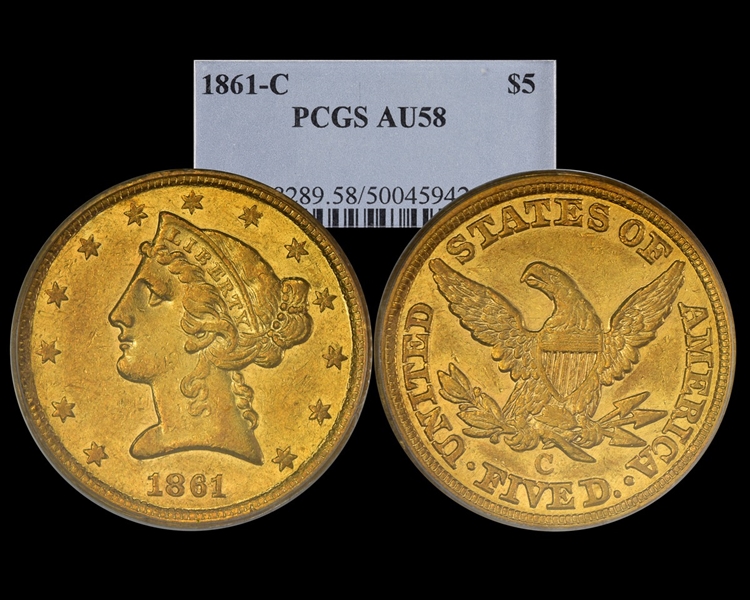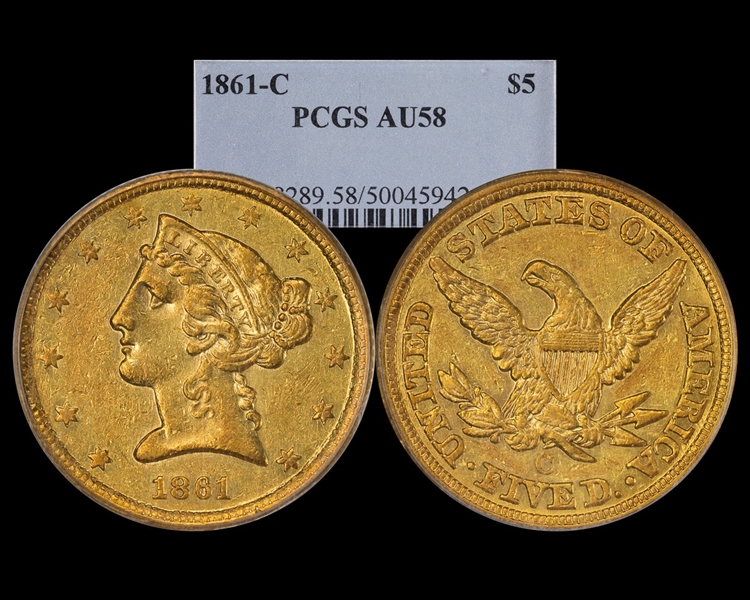1861-C $5 AU58 认证号50045942, PCGS号8289
拥有者评论
The "Big Daddy" of Charlotte mint coinage. The only Charlotte mint coin produced during the Civil War era before the mint’s coining operations shuttered its doors for good. Reflective mirrors with no heavy marks that are typically encountered with this particular date.
专家评论
Doug Winter
The 1861-C half eagle is the final coin produced at the Charlotte Mint. Of the 6,879 pieces produced, it is believed that 887 were struck in May 1861 under the supervision of the Confederacy. On April 20, the Charlotte Mint was seized by rebel troops. Current mint employees were forced to pledge loyalty oaths to the Confederacy or lose their jobs.Due to its low mintage, its status as a last-year-of-issue and its association with Confederacy, the 1861-C is one of the more popular Charlotte half eagles. Although it is a scarce coin in all grades, its rarity has been somewhat overstated in EF. It is scarce in AU and rare in properly graded AU53 to AU55. The 1861-C is very rare in AU58 and exceedingly rare in full Mint State, with just two or three examples known to me, including a choice MS63 that ranks among the most important Charlotte half eagles in existence.
STRIKE: The 1861-C is much better struck than either the 1859-C or the 1860-C half eagles. The obverse is fairly sharp with the exception of some weakness on the curls around the face. The curl below the ear is always weak. The top of the head is strong, as are the details on the bun. The first star is usually very flat while the rest are sharper with many showing full or nearly full radial lines. The border is sometimes weak from 3:00 to 6:00 with die crumbling noted on the denticles. I have seen some examples, however, with fully defined obverse denticles. The reverse is better struck than the obverse. Some have weakness seen on the neck of the eagle, but the overall level of sharpness is unmatched by any other of the late half eagles from this mint and is comparable to that seen on some of the issues from early 1850s.
SURFACES: Virtually every known 1861-C half eagle is seen with extremely choppy surfaces. It appears that the entire mintage went directly into circulation and that these coins were actively used in commerce. The fields are usually seen with deep digs and cuts. A smaller number show shallow mint-made flaws, especially in the reverse fields. Any 1861-C half eagles with relatively clean surface is very rare and desirable.
LUSTER: The luster on high grade pieces is mostly frosty with a slight satiny texture in the fields. The typical 1861-C has disturbed luster, either from heavy abrasions or from having been cleaned at one time.
COLORATION: The coloration ranges from deep green-gold and orange-gold to a higher yellow-gold shade. It is extremely hard to locate an 1861-C half eagle with original color.
EYE APPEAL: There are more reasonably attractive examples of this date than one might think, especially in the EF40 to AU50 grade range. Ironically, the level of eye appeal drops in the AU53 to AU58 range and most pieces graded as such have been processed at one time or show conspicuous abrasions. A high end AU example with good eye appeal is very rare and I have only seen one Uncirculated piece with good eye appeal.
DIE CHARACTERISTICS: A series of raised die scratches are present over the RIC in AMERICA. These are visible even on worn specimens.
DIE VARIETIES: There is a single variety known.
Variety 1 (formerly Variety 30-K): The date is small and low. The first 1 and second 1 is much closer to the denticles than to the bust. The reverse is the same as used 1858.
David Akers (1975/88)
This is the last year of coin production at this Mint due to the start of the Civil War. The 1861-C does not have the weak, indistinct reverse that appears on the 1959-C and 1860-C and, in fact, most specimens are quite well struck, at least by Charlotte Mint standards. The mintage of the 1861-C is the lowest of any Half Eagle produced at this Mint, although in my experience, and according to the auction data, this date is not as rare as the 1846-C or, of course, the 1842-C Small Date. Most known specimens are VF or EF but there are a few in the AU range and two or three that might qualify as uncirculated by today's grading standards. The finest I have seen was owned by Charlotte Mint specialist, Stanley Elrod.PCGS #
8289
设计师
Christian Gobrecht
边缘
Reeded
直径
21.65 毫米
重量
8.36 克
铸币数量
6879
金属成分
90% Gold, 10% Copper
更高评级数量
5
评级较低的钱币数量
109
地区
The United States of America
价格指南
PCGS 数量报告
拍卖 - PCGS 评级的
拍卖 - NGC 评级的
稀有性和存量估计 了解更多
| 所有评级 | 300 |
| 60或以上 | 5 |
| 65或以上 | 0 |
| 所有评级 | R-6.4 |
| 60或以上 | R-9.7 |
| 65或以上 | R-10.1 |
| 所有评级 | 77 / 112 TIE |
| 60或以上 | 29 / 112 TIE |
| 65或以上 | 1 / 112 |
| 所有评级 | 113 / 218 TIE |
| 60或以上 | 54 / 218 TIE |
| 65或以上 | 1 / 218 |
状况普查 了解更多
| #1 MS63 PCGS grade |
|
#2 MS62 estimated grade
NERCA 1/1982:1441 - Elrod Collection - Stack’s 5/1986:??? - Heritage 2/1999:6305, not sold - Heritage 1/2000:7769, $59,800 |
| #3 MS61 PCGS grade |
| #3 MS61 PCGS grade |
| #5 MS60 PCGS grade |





















